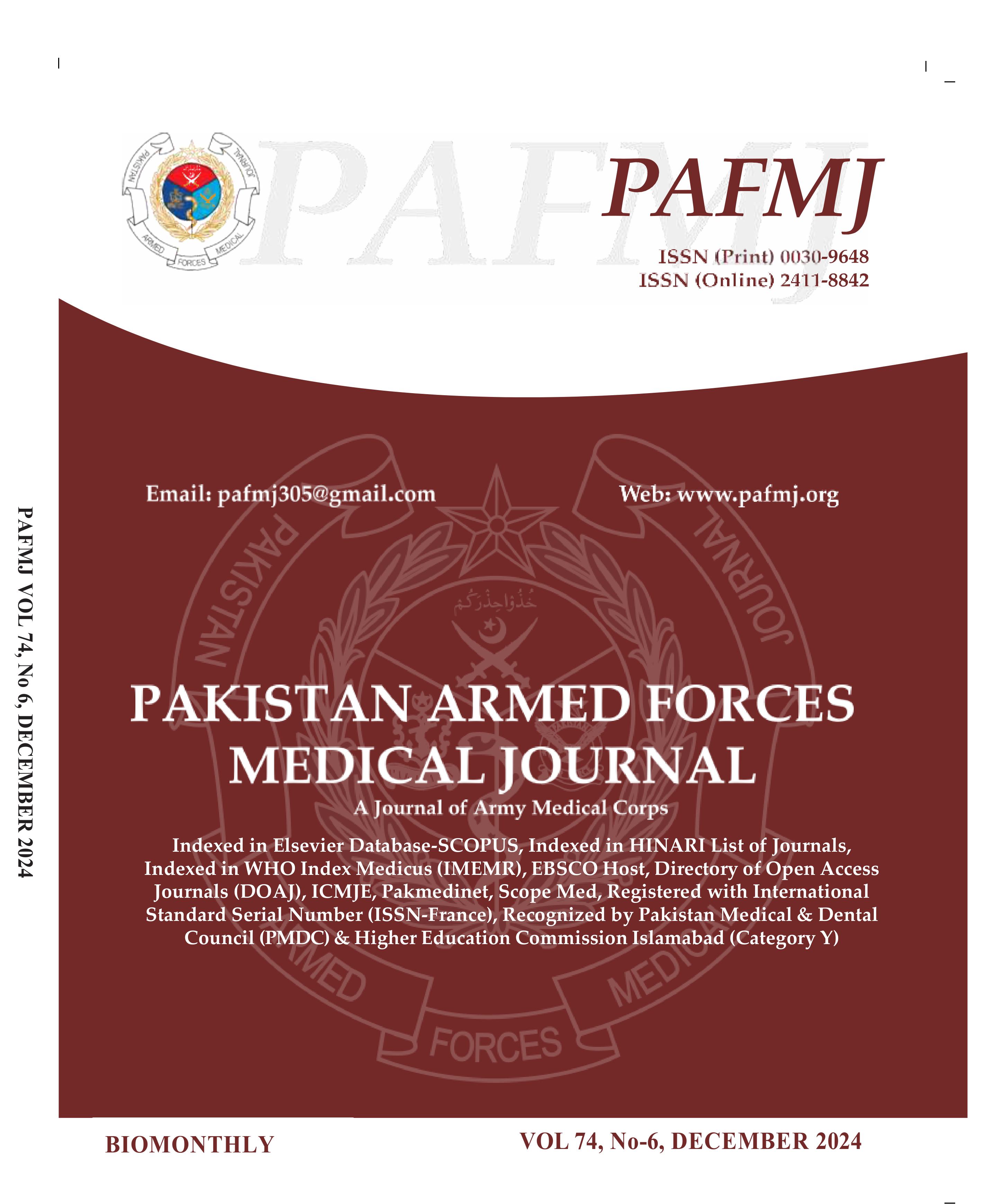Comparison of Oral Ivermectin and Permethrin 5% Lotion in Treatment of Pediculosis Capitis
DOI:
https://doi.org/10.51253/pafmj.v74i6.9510Keywords:
Ivermectin, pediculosis, permethrin.Abstract
Objective: To study the efficacy of oral Ivermectin compared with Permethrin 5% lotion for pediculosis capitis management.
Study Design: Randomized controlled trial.
Place and Duration of Study: Department of Dermatology, Combined Military Hospital, Abbottabad Pakistan, from Mar to Aug 2022.
Methodology: We enrolled 60 patients, aged between 8 to 36 years. Group A, with 30 patients, was given topical 5% Permethrin lotion in two applications, seven days apart. Group B, also with 30 patients and having more than 15 kg weight, was given oral Ivermectin 200 microgram per kilogram on Day 1 and repeated after 7 days with patients reassessed at Day 7 and 15. Demographic information along with frequency and percentages were calculated for qualitative variables by using SPSS version 26.0. To determine statistical significance, p-value of ≤0.05 was set as significant, and χ2-square test was used.
Results: On comparison of efficacy in group A (Permethrin-5%) only 14(46.6%) of the patients showed complete recovery, however, the majority 16(53.4%) of patients needed second dose and a few still had symptoms, while in group B (oral Ivermectin) majority 25(83.3%) of patients recovered at first dose whereas only 5(16.7%) patients needed second dose for complete recovery and no single patient had any symptoms after administration of second dose (p-value≤0.05).
Conclusions: The effectiveness of oral Ivermectin was much greater than that of 5% Permethrin lotion.
Downloads
References
Devore CD, Schutze GE, Council on School Health and Committee on Infectious Diseases, Okamoto J, Allison M, Ancona R, et al. Head lice. Pediatrics 2015; 135(5): e1355-65.
https://doi.org/10.1542/peds.2015-0746
Schachner LA, Hansen RC. Pediatric Dermatology. Elsevier Health Sciences 2011.
Smith CH, Goldman RD. An incurable itch: head lice. Can Fam Physician 2012; 58(8): 839-841.
Lesshafft H, Baier A, Guerra H, Terashima A, Feldmeier H. Prevalence and risk factors associated with pediculosis capitis in an impoverished urban community in Lima, Peru. J Glob Infect Dis 2013; 5(4): 138. https://doi.org/10.4103/0974-777X.122006
Suleman M, Jabeen N. Head lice infestation in some urban localities of NWFP, Pakistan. Ann Trop Med Parasitol 1989; 83(5): 539-547. https://doi.org/10.1080/00034983.1989.11812368
Davarpanah MA, Kazerouni AR, Rahmati H, Neirami RN, Bakhtiary H, Sadeghi M, et al. The prevalence of Pediculus capitis among the middle schoolchildren in Fars Province, southern Iran. Caspian J Intern Med 2013; 4(1): 607.
Sungkar SA, Dwinastiti YA, Haswinzky RA, Irmawati FP, Wardhana AW, Sudarmono PR, et al. Effectiveness of wet combing compared with 1% permethrin lotion for the treatment of pediculosis capitis. Int J Appl Pharm 2019; 11(6): 188-193. https://doi.org/10.22159/ijap.2019.v11s6.33523
Haghighizadeh A, Mortezanejad SA, Dadpour S, Rajabi O. Evaluation of anti-lice topical lotion of ozonated olive oil and comparison of its effect with permethrin shampoo. Rev Recent Clin Trials 2022; 17(1): 58-67.
https://doi.org/10.2174/1574887117666211115123242
Ameen M, Arenas R, Villanueva-Reyes J, Ruiz-Esmenjaud J, Millar D, Domínguez-Dueñas F, et al. Oral ivermectin for treatment of pediculosis capitis. Pediatr Infect Dis J 2010; 29(11): 991-993. https://doi.org/10.1097/INF.0b013e3181e8ae6f
Feldmeier H. Pediculosis capitis: new insights into epidemiology, diagnosis and treatment. Eur J Clin Microbiol Infect Dis 2012; 31(9): 2105-2110.
https://doissssss.org/10.1007/s10096-012-1575-0
Afridi M, Inayat S, Kakar S, Panezai A, Ghani S. Comparison of oral ivermectin and permethrin 1% shampoo in the treatment of pediculosis capitis. J Rawalpindi Med Coll 2021; 25(2): 192-196.
Ahmad HM, Abdel‐Azim ES, Abdel‐Aziz RT. Assessment of topical versus oral ivermectin as a treatment for head lice. Dermatol Ther 2014; 27(5): 307-310.
https://doi.org/10.1111/dth.12131
Jones KN, English JC. Review of common therapeutic options in the United States for the treatment of pediculosis capitis. Clin Infect Dis 2003; 36(11): 1355-1361.
https://doi.org/10.1086/374853
Ameen M, Arenas R, Villanueva-Reyes J, Ruiz-Esmenjaud J, Millar D, Domínguez-Dueñas F, et al. Oral ivermectin for treatment of pediculosis capitis. Pediatr Infect Dis J 2010; 29(11): 991-993. https://doi.org/10.1097/INF.0b013e3181e8ae6f
Yoon KS, Gao JR, Lee SH, Clark JM, Brown L, Taplin D, et al. Permethrin-resistant human head lice, Pediculus capitis, and their treatment. Arch Dermatol 2003; 139(8): 994-1000.
https://doi.org/10.1001/archderm.139.8.994
Sanchezruiz WL, Nuzum DS, Kouzi SA. Oral ivermectin for the treatment of head lice infestation. Am J Health Syst Pharm 2018; 75(13): 937-43. https://doi.org/10.2146/ajhp170747
Ahmad HM, Abdel‐Azim ES, Abdel‐Aziz RT. Assessment of topical versus oral ivermectin as a treatment for head lice. Dermatol Ther 2014; 27(5): 307-310.
https://doi.org/10.1111/dth.12131
Kokturk A, Baz K, Bugdayci R, Sasmaz T, Tursen U, Kaya TI, et al. The prevalence of pediculosis capitis in schoolchildren in Mersin, Turkey. Int J Dermatol 2003; 42(9): 694-698.
Downloads
Published
Issue
Section
License
Copyright (c) 2024 Huma Farid, Bushra Muzaffar, Muhammad Adeel Siddiqui, Majid Hussain, Danyal Sajjad, Zahra Nigar

This work is licensed under a Creative Commons Attribution-NonCommercial 4.0 International License.















